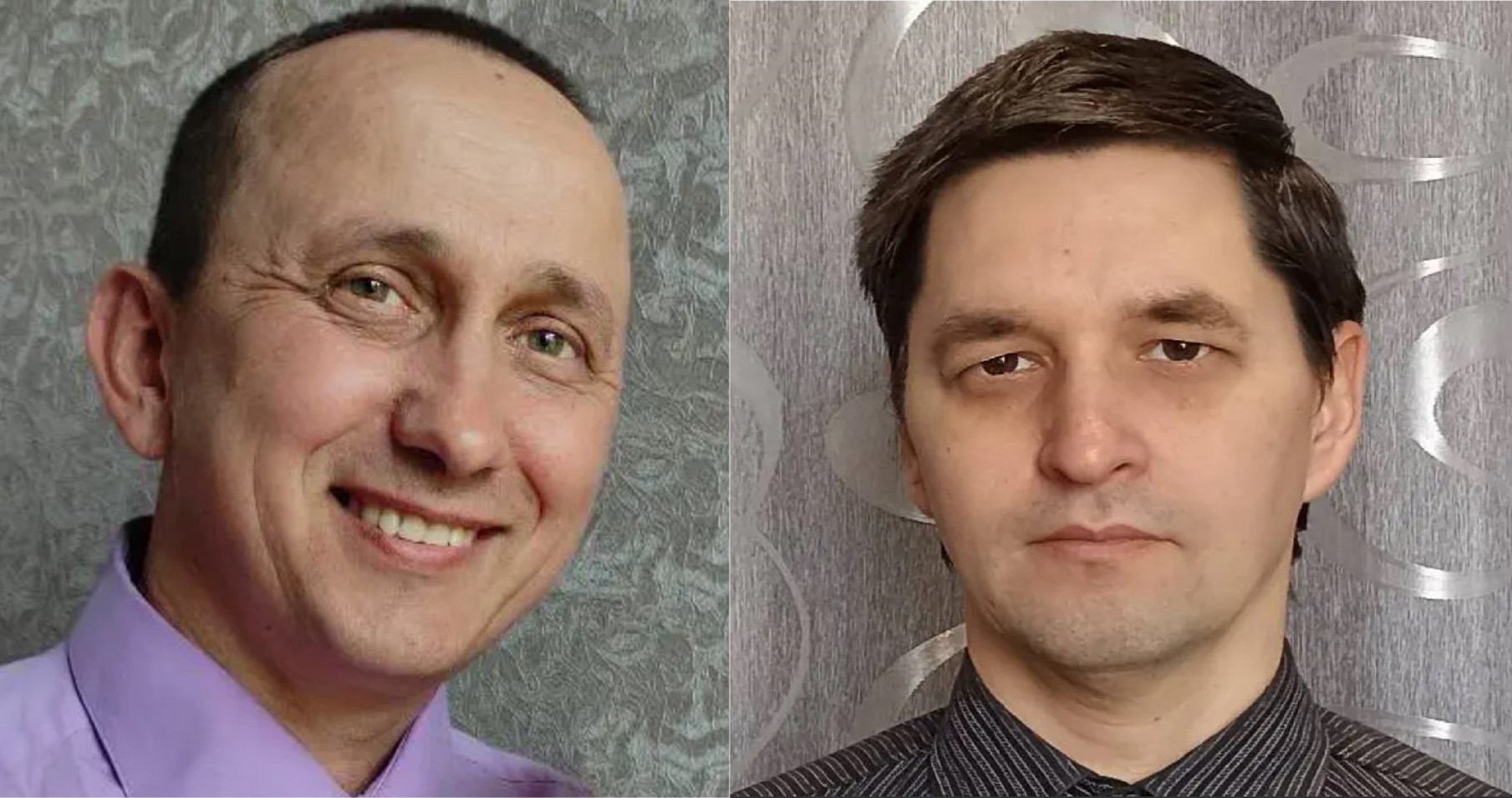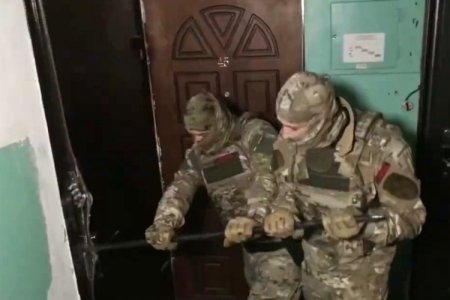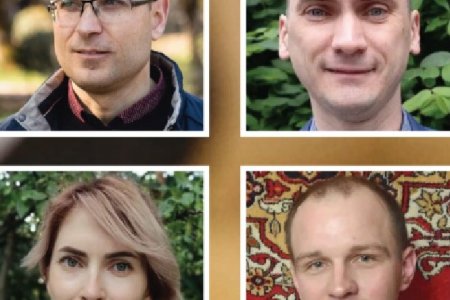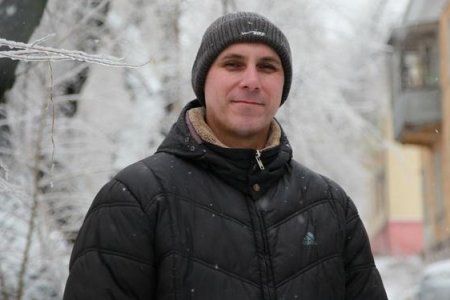
Russia’s Investigative Committee has announced the completion of another ‘criminal investigation’ against two Jehovah’s Witnesses from occupied Crimea. Yuriy Herashchenko and Serhiy Parfenovych face up to ten years’ imprisonment for practising their faith, with no possibility, by definition, of a fair trial.
The Investigative Committee’s report is a classic example of the manipulation that Russia uses to try to conceal overt religious persecution. Since even Russia’s constitution guarantees freedom of religion, the current regime set about labelling a world faith practised by millions as ‘extremist’. On 20 April 2017, Russia’s increasingly servile Supreme Court passed a ruling outlawing the Jehovah’s Witnesses as ‘an extremist organization’.
On the basis of that extraordinary ruling, the enforcement bodies and courts in Russia or occupied Crimea get a guaranteed success rate for their statistics on ‘fighting extremism’ by persecuting and imprisoning Jehovah’s Witnesses. Russian-controlled ‘investigators’, ‘prosecutors’ and ‘judges’ in occupied Crimea have proven especially zealous in such persecution, with almost every believer thus far arrested having been sentenced to six or seven years’ imprisonment.
The Investigative Committee, of course, coats the situation rather differently, calling the two believers – Yuriy Herashchenko (b. 1979) and Serhiy Parfenovych (b. 1972) “participants in the Krasnohvardiiske cell of the banned religious organization Jehovah’s Witnesses” Both men are charged with ‘organizing the activities of an extremist organization’ [Article 282.2 § 1 of Russia’s criminal code].
Everything about such prosecutions is disturbing, not least the fact that it is dealt with by ‘the investigative unit of the department for the investigation of particularly important cases’. The two men are accused of having “carried out activities banned by the court of the local religious organization the Jehovah’s Witnesses from April 2017 to September 2022”. Herashchenko has been a Jehovah’s Witness since 2000, Parfenovych became a believer even earlier, in 1993. The absurd charges described in the ‘investigators’ report merely begin from when the Russian Supreme Court rubberstamped Russia’s religious persecution until the moment that Parfenovych was arrested.
All of the individual assertions about the men’s activities seem aimed at justifying an ‘organizational role’ which would carry a longer sentence. Parfenovych is claimed to have been ‘the head of the highest body of management’ and ‘ideological leader’, with Heraschenko having supposedly helped him in this. Both men are alleged to have taken part in “coordinating the activities of adepts”, holding meetings both in real time and on line to discuss religious literature, etc.
While the defence may well dispute how much any individual leader is either the organizational or the ideological leader of a community of believers, the charges otherwise pertain solely to the normal activities of any Jehovah’s Witnesses.
This is not how either the Investigative Committee or Russian state media present such arrests. The report goes on to assert that “the criminal activities of the organizer of the Krasnohvardiisk cell were stopped” by officers from the FSB [security service] and police centre for countering extremism at the end of September 2022. This refers to Parfenovych, whereas Herashchenko was detained on 22 March 2023 while supposedly “trying to hide on the territory of another state”.
Both men are married, with Parfenovych and his wife having six children. The two were both held briefly (for 2 and 3 days) in detention and are now under house arrest.
Yuriy Herashchenko and Serhiy Parfenovych are facing sentences of up to seven years’ imprisonment for practising their faith. This is manifestly in violation of international agreements which Russia is signatory to, as well as of Russia’s own constitution. The violations, however, are even more shocking given that Russia is flouting international law by applying its repressive legislation on illegally occupied Ukrainian territory.
The men’s ‘case’ was passed on 3 July to the occupation /Krasnohvardiisk district court’ under ‘judge’ Valentin Vladimirovich Shukhalsky.
Other persecution of Jehovah’s Witnesses in occupied Crimea
In 2017 Russia still confined itself to administrative prosecutions against Jehovah’s Witnesses in occupied Crimea. The first arrest on ‘criminal’ charges was of Serhiy Filatov (b. 1972), who was charged after a mass operation against believers in Dzhankoi during the night from 15-16 November 2018. During Filatov’s ‘trial’ at the occupation ‘Dzhankoi District Court’, the prosecution claimed that the Jehovah’s Witness had “undermined the foundations of the constitutional order and the security of the state”, by being the leader of a religious organization. On 5 March 2020, he was sentenced by ‘judge’ Maria Yermakova to six years’ imprisonment in a medium security prison colony. That sentence against the 47-year-old father of four was then upheld by ‘judge’ Edward Belousov of the Crimean High Court on 26 May 2020. Beloysov is one of eight ‘judges’ and enforcement officers recently placed on the EU’s sanctions list. All those implicated in such illegal ‘trials’ should also be placed under such sanctions.
Artem Gerasimov (b. 1985) from Yalta was arrested during a second wave of armed raids on 20 March 2019. The initial verdict against him coincided with the sentence against Filatov, and it is possible that this was the reason that ‘judge’ Vladimir Romanenko from the occupation ‘Yalta municipal court’ initially ‘only’ imposed a massive fine, unlike the 6.5 year real sentence demanded by prosecutor Oksana Chuchuyeva. The fine was challenged by the prosecutor, and it was that appeal which the ‘High Court’ on 4 June allowed, imposing instead a six-year sentence.
Viktor Stashevsky (b. 1966) was sentenced by ‘judge’ Pavel Krylo from the occupation ‘Gagarin district court’ on 23 March 2021 to six and a half years’ imprisonment on the same ‘organizing extremist activities’ (Article 282.2 § 1 ) charge, and taken into custody in the courtroom. The sentence was upheld on 10 August 2021 by ‘judge’ Vladimir Avkhimov from the ‘Sevastopol municipal court’.
Igor Schmidt (b. 1972) was sentenced by ‘judge’ Liudmyla Tumaikina from the same ‘Gagarin district court’ to six years, with this upheld on 17 January 2022. During the original ‘trial’, Schmidt pointed out that the so-called ‘investigators’, the prosecution and the ‘expert assessments’ had all been aimed at proving that he was a Jehovah’s Witness, something he had never denied. On the contrary, he said, he was proud to be a believer.
Artem Shabliy (b. 1990) was initially arrested on 26 May 2020 after armed men burst into his home and caused injuries to one of his two small children by quite unnecessarily breaking a window during the raid. He did, at least, face the lesser charge of so-called ‘participation in an extremist organization’ (under Article 282.2 § 2) and was, on 16 February 2022, given a two-year suspended sentence by ‘judge’ Iryna Altanets from the ‘Kerch municipal court’.
The following sentences are still subject to appeal.
Volodymr Maladyka (b. 1963), Volodymyr Sakada (b. 1970) and Yevhen Zhukov (b. 1969) from Sevastopol were sentenced on 6 October 2022 to six years’ imprisonment, with it claimed that they had ‘threatened the constitutional order and state security’ by reading and discussing religious literature. While the three men were all charged with ‘organizing the activities of an extremist organization’ (Article 282.2 § 1 ), ‘judge’ Olga Berdnikova from the ‘Nakhimovsky district court in Sevastopol cannot have been in any doubt that she was imprisoning them for refusing to renounce or conceal their faith.
Oleksandr Dubovenko (b. 1973) and Oleksandr Lytvyniak (b. 1960) were sentenced on 1 December 2022 to six years’ imprisonment, with the main ‘evidence’ against them being a Zoom conversation about the Bible. This was claimed to constitute ‘‘organizing the activities of an extremist organization’ (Article 282.2 § 1). Both men had been held under house arrest for over a year, and were taken into custody after the 6-year sentence, demanded earlier by prosecutor Minigul Saldykova and passed by ‘judge’ Tatiana Fiedievna from the ‘Armiansk municipal court’.
Taras and Daria Kuzio, Serhiy Liulin and Petro Zhiltsov
Taras Kuzio (b. 1978) is facing a sentence of 6.5 years’ imprisonment; Petro Zhiltsov (b. 1987) and Serhiy Liulin (b. 1984) 6.1 years; and Daria Kuzio (b. 1982, and Taras’ wife) – a 3.5-year suspended sentence. The sentences were passed by ‘judge’ Vladimir Romanenko from the ‘Yalta municipal court’ on 27 February 2023.
This was the first time in occupied Crimea that a new charge was laid with two of the men: Taras Kuzio and Petro Zhiltsov accused of ‘financing an extremist organization’ under Article 282.3 § 1 of Russia’s criminal code, as well as of ‘organizing’ such an ‘organization’ (Article 282.2 § 1). It is indicative of its meaningless that the extra charge did not result in any difference between the sentences against Liulin and Zhiltsov.
It is worth stressing here that any suspended sentence can become real if a person is deemed to have ‘offended’ again. In all cases involving believers in occupied Crimea, there is no offence, only faith which the victims of this religious persecution have no intention of renouncing.
Other prosecutions
Tadevos Manukian (b. 1981) was initially charged (with ‘organizing a so-called extremist organization’ under Article 282.2 § 1 together with Taras Kuzio and the others. His prosecution was, however, made into a separate ‘case’.
Viktor Kudinov (b. 1969) and Serhiy Zhyhalov (b. 1971)
The two men from Sevastopol were arrested after the latest armed searches of believers’ homes. Both were subsequently placed under house arrest, although this was replaced in March 2023 by restrictions on certain activities. The two men are also accused of ‘organizing a so-called extremist organization’ under Article 282.2 § 1 for holding services online.
Dmytro Naukhatsky (b. 1969) has been under house arrest since December 2022, when he was arrested after the FSB carried out mass armed raids of at least 16 homes of believers in Simferopol. He was initially charged with ‘organizing the activities of a so-called extremist organization’ (under Article 282.2 § 1), however on 24 March 2023, the same ‘investigator’, V.A. Novikov added a charge of ‘financing the activities of an extremist organization’ (Article 282.3 § 1).
Oleksandr Voronchykhin (b. 1963) was only interrogated, not detained, and is under a signed undertaking not to leave the city. He appears to be facing the ‘organizing’ charge under Article 282.3 § 1.
Oleksandr Kostenko from Sevastopol has been mentioned as facing charges since September 2020, It is possible that he had left occupied Crimea before the FSB’s repressive machine got to him.



